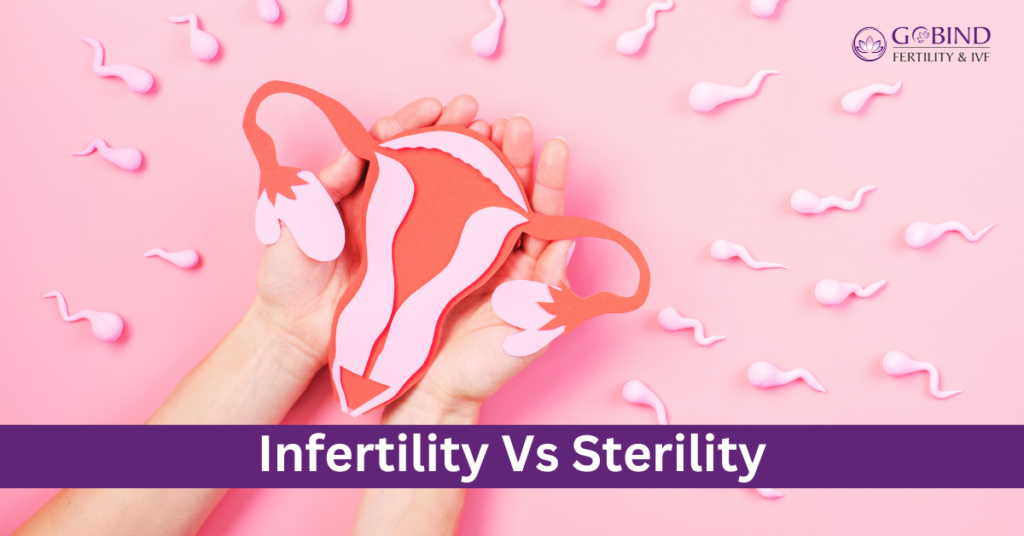Infertility Vs Sterility: A Comparative Overview

Infertility and sterility are often used interchangeably, but they are distinct medical conditions. Understanding the differences between these two terms is crucial for individuals experiencing reproductive challenges and for healthcare professionals providing guidance.
Infertility
Infertility is the inability to conceive and carry a pregnancy to term after a year of unprotected sexual intercourse. It can affect both men and women and can be caused by various factors.
Common causes of infertility include
- Ovulation issues: Irregular or absent ovulation can prevent fertilization.
- Fallopian tube problems: Blockages or damage to the fallopian tubes can hinder the movement of sperm and eggs.
- Endometriosis: A condition where tissue similar to the uterine lining grows outside the uterus can affect fertility. This extra tissue can attach to other organs, such as the ovaries, fallopian tubes, and even the bladder or intestines.
- Uterine abnormalities: Uterine abnormalities are structural deviations from the normal shape or size of the uterus. These abnormalities can affect fertility, pregnancy outcomes, and menstrual health.
- Male infertility: Factors such as low sperm count, poor sperm quality, or erectile dysfunction can contribute to infertility.
- Hormonal imbalances: Hormonal imbalances can disrupt the reproductive process.
- Chronic health conditions: Certain medical conditions, such as diabetes, thyroid disorders, and autoimmune diseases, can impact fertility.
Sterility
Sterility, on the other hand, is the complete inability to reproduce. It is often a permanent condition and is typically caused by underlying medical issues or surgical procedures that render an individual incapable of conceiving or carrying a pregnancy.
Common causes of sterility include:
- Surgical procedures: Hysterectomy (removal of the uterus), tubal ligation (tying of the fallopian tubes), or vasectomy (surgical sterilization of the vas deferens) can render an individual sterile.
- Severe reproductive organ damage: Damage to the reproductive organs due to infections, trauma, or congenital abnormalities can lead to sterility.
- Genetic factors: In some cases, genetic conditions can cause sterility.
- Radiation or chemotherapy: Exposure to radiation or chemotherapy can damage reproductive tissues and lead to sterility.
Key Differences:
| Feature | Infertility | Sterility |
| Definition | Inability to conceive and carry a pregnancy after a year of unprotected sex. | Complete inability to reproduce. |
| Reversibility | Often reversible with medical interventions or treatments. | Typically irreversible. |
| Causes | Various factors, including ovulation issues, fallopian tube problems, endometriosis, uterine abnormalities, male infertility, hormonal imbalances, and chronic health conditions. | Surgical procedures, severe reproductive organ damage, genetic factors, and radiation or chemotherapy. |
Potential Treatments for Sterility and Infertility
- In Vitro Fertilization (IVF)
- This involves retrieving eggs, fertilizing them with sperm in a laboratory, and transferring the embryos into the uterus.
- It can be effective for couples with male infertility, female infertility, or unexplained infertility.
- Intracytoplasmic Sperm Injection (ICSI)
- A specialized technique is used when sperm quality is poor. A single sperm is injected directly into an egg.
- This can be combined with IVF for couples facing severe male infertility.
- Donor Sperm or Eggs
- For couples where one partner has a complete absence of reproductive cells, using donor sperm or eggs can be an option.
- This involves a rigorous screening process for donors.
- Surrogacy
- For couples who cannot carry a pregnancy, a surrogate can carry a baby for them.
- This involves legal and ethical considerations.
- Experimental Treatments
- Ongoing research is exploring new techniques, such as stem cell therapy and genetic engineering, to address certain cases of sterility. However, these are still in the experimental stages and may not be widely available.
Important Considerations
- Success Rates: The success rates of these treatments vary depending on individual factors, such as age, underlying causes of sterility, and the specific treatment chosen.
- Emotional Impact: Dealing with sterility can be emotionally challenging. Seeking support from fertility specialists, support groups, or mental health professionals can be beneficial.
- Financial Factors: Fertility treatments can be expensive. Considering the costs involved and exploring insurance coverage or financial assistance options is essential.
While infertility and sterility can be distressing, it’s important to understand the distinctions between them. Infertility may be temporary and treatable, while sterility is often permanent. It’s crucial to consult with a fertility specialist Dr. Manju Khurana, one of the best fertility specialist in Hisar to discuss your specific situation, understand the available options, and make informed treatment decisions.
